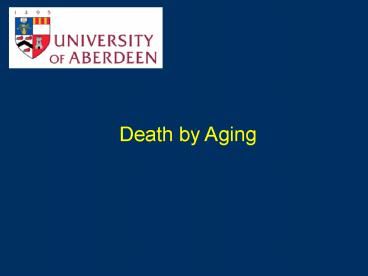Death by Aging PowerPoint PPT Presentation
1 / 21
Title: Death by Aging
1
Death by Aging
2
Death by aging Age best predictor of death
- Age
- Severity of illness
- Sadness
- Fitness level
- Gender
- Weight
3
Death by aging Age best predictor of death
- Age
- Severity of illness
- Sadness
- Fitness level
- Gender
- Weight
www.nerdtests.com/ft.dead.php
4
Death by aging Age best predictor of deathor is
it?
- Average age of death in American males is 75.8
years - Average age of death of all 321 American rock
stars who died since 1954 is 36.9 years
5
Death by aging Age best predictor of deathor is
it?
murder
cancer
accident
suicide
drugs/alcohol
heart attack
medical
6
Death by aging Age best predictor of deathor is
it?
- 23 died in 8 separate air crashes
- 5 drowned
- 3 electrocuted
- 3 died in fires
- 3 died from brain tumours
7
Death by aging Lifetime odds
- Car crash 1 in 242
- Drowning 1 in 1,028
- Air crash 1 in 4,608
- Lightning 1 in 71,501
8
Death by aging More than one way to die -
apoptosis
- Cell suicide, death by design
- Affects single cells
- Physiological, needs energy
- Programmed, tightly regulated
- Cell contents contained, no inflammatory response
9
Death by aging More than one way to die - necrosis
- Death by accident / lethal injury
- Affects groups of cells
- No energy requirement
- Total cell lysis
- Release of cell contents
- Significant inflammatory response
10
Death by aging Apoptosis
- Organised, controlled sequence of events
- Regulates cell numbers
- Physiological involution pathological atrophy
- Removes damaged cells
- All cells capable of apoptosis
11
Death by aging Apoptosis in action
DNA damage
Recovery
DNA repair
Excessive DNA damage
Removal
Apoptosis
MALIGNANT CELL
12
Death by aging Apoptosis and oxidative stress
- Free radicals produced physiologically
- Reactive, unstable, indiscriminate
- Controlled by antioxidants inbalance results in
oxidative stress - Oxidative stress causes mitochondrial damage and
activation of apoptosis
13
Death by aging Mitochondria
- Free radicals produced during respiration in
mitochondria - Free radicals production in mitochondria
inversely correlates with lifespan - Mitochondria intricately involved in apoptosis
14
Death by aging Apoptosis and oxidative stress
- Mice with gene deletions of antioxidant proteins
have increased apoptosis and shortened life span - Mammals fed antioxidants have increased average
lifespan - Oxidative stress over the lifespan of an organism
may elicit its effects on aging via regulation of
mitochondria-dependent apoptosis
15
Death by aging Apoptosis signals
Extrinsic pathway
Intrinsic pathway
Fas ligand
Fas
FADD
Bax
Cytochrome c
Caspase 8
Bid
Bcl
Caspase 3 Caspase 7
APOPTOSIS
16
Death by aging Apoptosis and aging
- The incidence of cancer and neurodegenerative
diseases increases with age - Marked tissue specific signalling of apoptosis
- Both decreased and increased apoptosis have been
described
17
Death by aging Apoptosis, aging and cancer
- The incidence of cancer increases with age
- Mutations in tumour suppressor p53 gene more
frequent as age increases - p53-dependent apoptosis removes cells likely to
develop into tumours - Failure of apoptosis more cancer
18
Death by aging Apoptosis and cancer therapy
- Radiotherapy and chemotherapy exploit apoptotic
pathways - Metastasis balance between proliferation and
apoptosis- related to apoptotic gene expression - Genetic alterations can modulate metastatic
potential of tumours
19
Wednesday, 15 March 2006
Pepper torches cancer cells
The ingredient which makes jalapeno peppers hot
also makes prostate cancer cells commit suicide,
a study suggests. Tests showed that capsaicin
triggered 80 of the cells to start the process
leading to cell death. The US research in the
journal Cancer Research also found tumours
treated with capsaicin were smaller. UK prostate
experts say capsaicin could be the basis of a
future drug but warned eating too many hot
peppers has been linked to stomach cancer.
20
Death by aging Apoptosis and macular degeneration
- Age related macular generation affects 10-20
people over 65 - Increased loss of retinal pigment epithelium,
photoreceptors, and inner nuclear layer cells by
apoptosis - May be related to oxidative damage from excessive
sunlight exposure
21
Death by aging CRAN
- Calorie restricted adequate nutrition
- Increases average and maximum lifespan in
rodents, decreases free radical damage in humans - Incidence of cancer decreases
- Affects insulin/IGF pathway
- Altered apoptosis described

